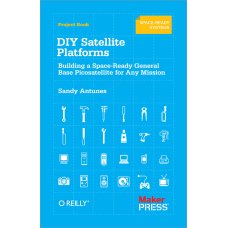Want to build your own satellite and launch it into space? It’s easier than you may think. The first in a series of four books, this do-it-yourself guide shows you the essential steps needed to design a base picosatellite platform—complete with a solar-powered computer-controlled assembly—tough enough to withstand a rocket launch and survive in orbit for three months.
Whether you want to conduct scientific experiments, run engineering tests, or present an orbital art project, you’ll select basic components such as an antenna, radio transmitter, solar cells, battery, power bus, processor, sensors, and an extremely small picosatellite chassis. This entertaining series takes you through the entire process—from planning to launch.
- Prototype and fabricate printed circuit boards to handle your payload
- Choose a prefab satellite kit, complete with solar cells, power system, and on-board computer
- Calculate your power budget—how much you need vs. what the solar cells collect
- Select between the Arduino or BasicX-24 onboard processors, and determine how to use the radio transmitter and sensors
- Learn your launch options, including the providers and cost required
- Use milestones to keep your project schedule in motion
About the Author
Alexander "Sandy" Antunes (born 1967 in Baltimore, Maryland) is a Maryland-area astronomer, author, and role playing game designer. He graduated from Boston University in 1989 with a dual major in astronomy and physics, received a Masters in astronomy from Penn State in 1992, and received his PhD in computational astrophysics from George Mason University in 2005. He was the Maryland Science Center "Science Person of the Month" for May 2007.
Chapter 1 Overview
- What Is a Picosatellite?
- Where Is Orbit?
- Pico-Goals
- LEO Conditions and Viability
- LEO Temperatures
- How I Got Started
- Budgets
Chapter 2 PCB Fab, Soldering, and Electronics
- Gerber Files
- Breadboarding and Prototyping
- Fabricating PCBs
- Quality Control
- Soldering
- Parts Is Parts
- Parts Suppliers
Chapter 3 Chassis, Structure, and Gross Anatomy
- Parts Is Parts
- CubeSats and TubeSats
- Shielding
- Payload Bays
- Flight Spares
Chapter 4 Power
- Power In
- Power Architecture
- Power Charging Efficiency
- Power Out
- Power Charging Curves
Chapter 5 Programming and Coding
- Core Processor
- Sensor Programming
- Packet Data
- Radio Transmission Programming
- More on Hardware
Chapter 6 Launching and Rockets
- Blowups Happen
- Form Factor
- InterOrbital Systems
Chapter 7 Milestones and Planning
- Checklists
- Research and Design (2 months)
- Setup (1 month)
- Core Work (5 months)
- Integration and Testing (2 months or more)
- Team Work
- Final Step
- Sample Case: Project Calliope TubeSat-style Picosatellite
Colophon
DIY Satellite Platforms
- Brand: Make:
- Product Code: Bok-DIY-Sat-Platfm
- Reward Points: 2
- Availability: 2 - 3 Days
-
रo 175.00
- Price in reward points: 175


